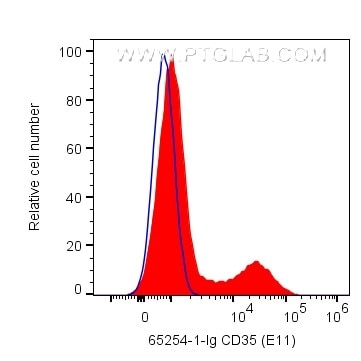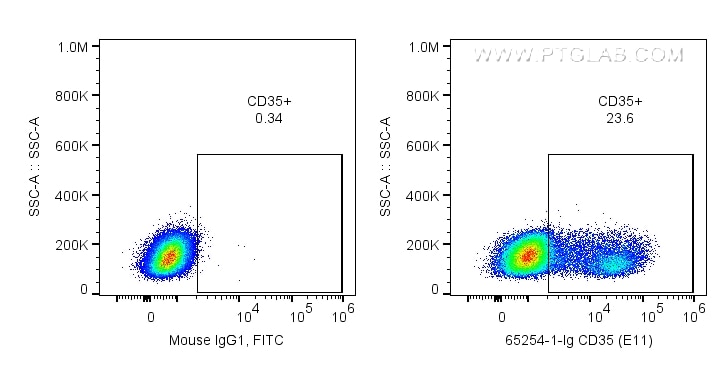Tested Applications
| Positive FC detected in | human PBMCs |
Recommended dilution
| Application | Dilution |
|---|---|
| Flow Cytometry (FC) | FC : 0.2 ug per 10^6 cells in 100 μl suspension |
| This reagent has been tested for flow cytometric analysis. It is recommended that this reagent should be titrated in each testing system to obtain optimal results. | |
| Sample-dependent, Check data in validation data gallery. | |
Product Information
65254-1-Ig targets CD35 in FC applications and shows reactivity with human samples.
| Tested Reactivity | human |
| Host / Isotype | Mouse / IgG1, kappa |
| Class | Monoclonal |
| Type | Antibody |
| Immunogen |
Human CD35 from Acute monocytic leukemia cells and normal blood monocytes Predict reactive species |
| Full Name | complement component (3b/4b) receptor 1 (Knops blood group) |
| Calculated Molecular Weight | 224 kDa |
| GenBank Accession Number | NM_000573 |
| Gene Symbol | CR1 |
| Gene ID (NCBI) | 1378 |
| ENSEMBL Gene ID | ENSG00000203710 |
| RRID | AB_3084912 |
| Conjugate | Unconjugated |
| Form | Liquid |
| Purification Method | Affinity purification |
| UNIPROT ID | P17927 |
| Storage Buffer | PBS with 0.09% sodium azide, pH 7.3. |
| Storage Conditions | Store at 2-8°C. Stable for one year after shipment. |
Background Information
CD35, also known as complement receptor type 1 (CR1) or C3b/C4b receptor, is a single-chain glycoprotein consisting of 30 repeating homologous protein domains known as short consensus repeats (~60 amino acids each) followed by transmembrane and cytoplasmic domains (PMID: 8765013). CD35 is variably expressed by granulocytes, monocytes, B cells, some T cells, erythrocytes, follicular dendritic cells, Langerhans cells, and glomerular podocytes (PMID: 19004497). CD35 acts as a receptor for C3b and C4b and plays important roles in the regulation of the complement cascade and clearance of immune complexes.
Protocols
| Product Specific Protocols | |
|---|---|
| FC protocol for CD35 antibody 65254-1-Ig | Download protocol |
| Standard Protocols | |
|---|---|
| Click here to view our Standard Protocols |






